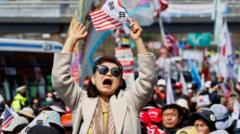As South Korea faces a deepening political crisis following the impeachment of President Yoon Suk Yeol, his supporters' extreme actions and narratives, often propagated by right-wing YouTubers, have intensified societal polarization, leaving a fractured political landscape in their wake.
The Polarising Legacy of Impeached President Yoon Suk Yeol in South Korea

The Polarising Legacy of Impeached President Yoon Suk Yeol in South Korea
Yoon Suk Yeol's impeachment has amplified divisions in South Korea, fueling radical fringe movements and violence among his supporters.
Pained cries rang out in front of former South Korean President Yoon Suk Yeol's official residence on Friday, as judges of the Constitutional Court confirmed his impeachment. "I came here with hope in my heart, believing we would win... It's so unfair," lamented 64-year-old Won Bog-sil at the rally, where thousands had gathered in support of Yoon. Scenes from the rally were streamed live, capturing the anger and disillusionment resonating among his supporters, some of whom echo sentiments promoted by right-wing YouTubers.
Despite Yoon’s fall from power, he leaves behind a country starkly divided. His controversial martial law declaration in December eroded his support, yet it has galvanized a fringe movement that embraces increasingly extreme views, emerging from online platforms into physical protests. Signs declaring "Stop the Steal" reflect strategies borrowed from U.S. political movements, further fuelling confrontations that have shown a troubling trend towards violence.
Shortly after Yoon’s arrest earlier this year, outraged supporters charged a courthouse in Seoul, armed and ready to confront law enforcement. Tragic incidents, such as the self-immolation of an elderly man who protested alleged leftist threats to South Korea, have underscored the desperation within this faction. Critics, including some conservatives, express concern over the radicalization of Yoon's base, warning that they are cultivating a dangerous political environment driven by conspiracy theories and simmering unrest.
Embracing the far-right rhetoric of influential YouTubers, Yoon’s supporters accuse opposition lawmakers of undermining the nation, alleging connections to North Korea and electoral fraud. Many young supporters have become vocal advocates on platforms such as YouTube, with rising stars amplifying calls for action against perceived injustices. Despite mounting evidence to counter these claims, disillusioned voters cling to the narrative of their leader as a martyr for South Korea’s democratic ideals.
Political analysts note that Yoon’s impeachment has paradoxically buoyed his party’s support, which has rebounded significantly following a brief dip in popularity. Observers are perplexed by this phenomenon, considering the deep infighting within the ruling party and the escalating conflict with opposition factions, many of whom are also intensifying their own polarizing efforts online.
Yoon’s leadership style and the surfacing of a more emboldened right have caused fractures even within his party. While some lawmakers have rallied to support him, others, disillusioned by his actions, have joined the ranks calling for his impeachment. With this political turmoil, the societal fabric of South Korea grows increasingly strained, leaving experts to warn that both the left and right might be irreparably driven apart.
As criticisms of Yoon escalate, so do concerns about the radical and ungovernable elements he has fostered within conservatism, raising alarms about the long-term implications for South Korea’s political stability and unity. "After witnessing this insurrection, any attempts for compromise will likely be viewed as unacceptable," remarked Christopher Jumin Lee, a lawyer and Korea expert, reflecting the challenges facing the nation in these fractious times.

















